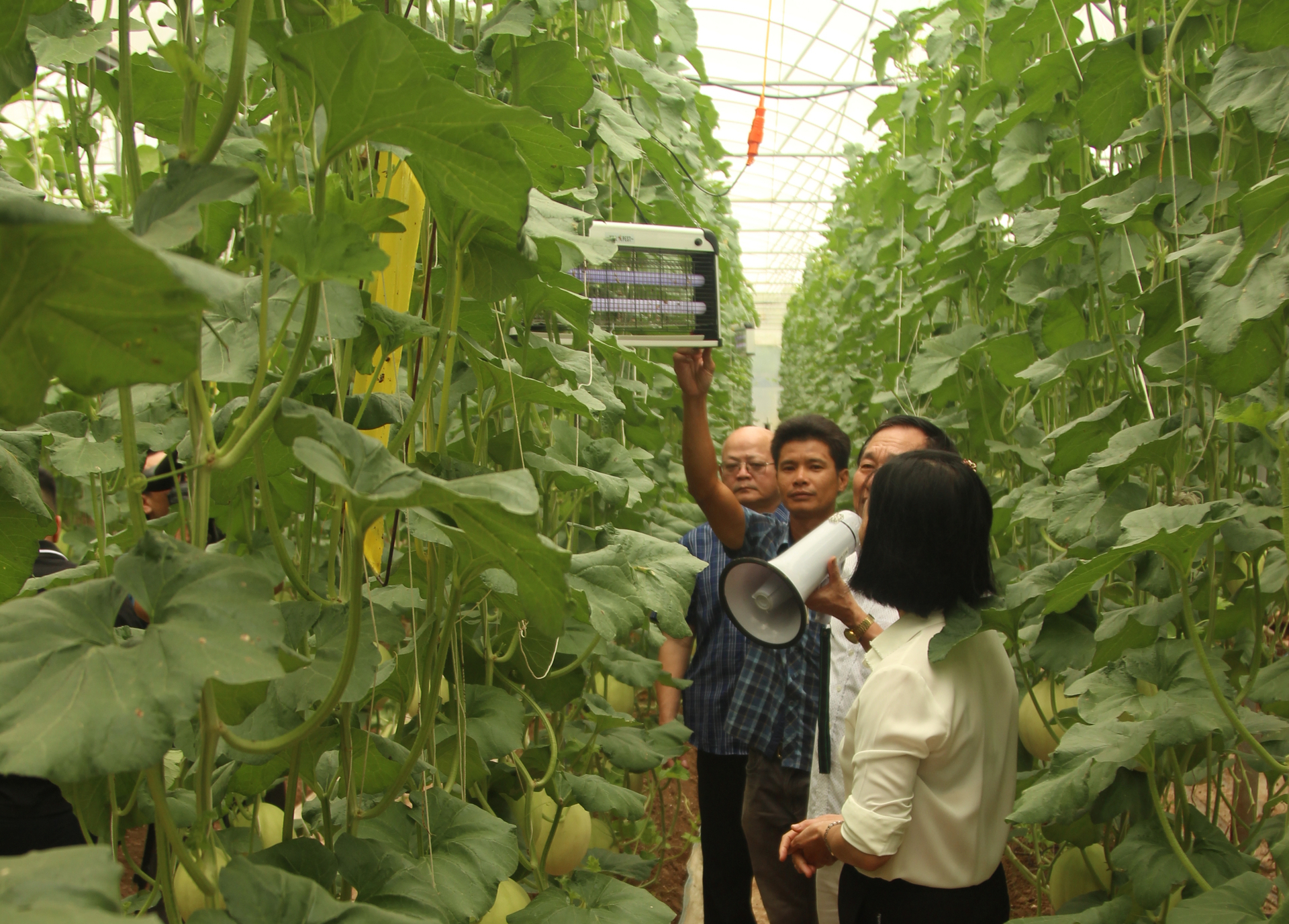November 28, 2025 | 05:38 GMT +7
November 28, 2025 | 05:38 GMT +7
Hotline: 0913.378.918
November 28, 2025 | 05:38 GMT +7
Hotline: 0913.378.918
In Chi Lang Nam commune (Thanh Mien, Hai Duong), the Center for Science and Technology Application and Seed Testing (Hai Duong Department of Science and Technology) recently held a workshop to evaluate the results of "Transfer the application of light spectrum advanced technology to the production of flowers and fruit trees in Hai Duong province".

Membrane houses and nethouses use lamps with light spectrum technology to increase efficiency in attracting and eliminating pests. Photo: Pham Ninh Hai.
In 2023, the Center for Science and Technology Application and Seed Testing implemented a melon growing model in membrane houses and nethouses using insect-catching lights Model DCT.01 DA 8W at Bui Van Duy's household in Kim Xuyen commune (Kim Thanh district) and Vu Van Phong in Chi Lang Nam commune (Thanh Mien district) with a total area of 2,000 m2.
As a result, the household stopped using pesticides and switched to pest-catching lamps, and there was no sight of pests in the gardens. The method is applied creatively as farmers do not leave the lights fixed at one point but instead move them continuously to many different locations in the garden on a cycle of 5-7 days. When turned on, the lamp uses the UVA light spectrum to attract gray butterflies, brown planthoppers, thrips, gnats, beetles and destroy them with high-voltage electric shock by a metal grid. The lamp has low power consumption, safe, effective, and easy to operate.
In terms of economic efficiency, after deducting the cost of electricity, farmers save nearly VND 1.5 million/year/1,000 m2 of crops compared to using pesticides. This technology brings many social benefits as well. Not using pesticides will lessen the effects on the environment, and the final products are clean and safe to consume, contributing to protecting the health of both producers and consumers.
Translated by Samuel Pham
/2025/11/27/3830-1-152901_403.jpg)
(VAN) Dong Nai is developing its key crop areas, expanding planting area codes, and applying high technology to increase the value of agricultural products, aiming at a green and sustainable agriculture.

(VAN) Tay Ninh’s livestock sector is undergoing a major transformation, applying high-tech, closed-loop circular models to build sustainable value chains.
/2025/11/26/3627-4-082628_818.jpg)
(VAN) From a small café on the red basalt highlands, Le Van Hoang started a business with clean coffee, building Enjoi Coffee into a symbol of organic agriculture in the Lam Dong plateau.
/2025/11/25/0045-1-135246_13.jpg)
(VAN) Ca Mau is researching a model of sea-encroaching embankments combined with viaducts and logistics service zones, aiming both to prevent erosion and create land funds for marine economic development.

(VAN) The information was shared at the seminar 'Urban Agriculture - Solutions for Developing Green Spaces,' organized by the Kinh te & Do thi Newspaper and the Biotechnology Center of Ho Chi Minh City.
/2025/11/19/4141-2-132831_216.jpg)
(VAN) One of Japfa's outstanding solutions is implementing digital transformation and artificial intelligence (AI) to optimize operations, enhance productivity, and advance sustainable development.
/2025/11/19/4847-1-093540_448.jpg)
(VAN) The Gia Lai Provincial People’s Committee had a working session with the delegation of the U.S. Department of Agriculture, the State of Idaho, and representatives of the State's leading enterprises.